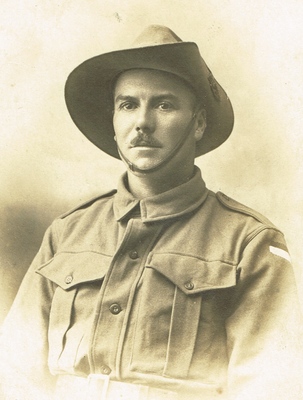
A century on from the end of World War I we acknowledge their service …
Lest we forget.
Private Robert Henry ‘Bert’ Ellett
Born: 1 March 1888 Springvale. Died: 27 September 1925 Melbourne.
Enlisted: 20 October 1914 aged 26
Served: Egypt, Gallipoli and Western Front
The Elletts became one of the pioneering families at Pakenham South, acquiring a 50 acre property called “Wattle Vale” on McDonald’s Drain Road. Bert’s father John paid £2.10 per acre for what had been swamp land and proceeded to fence, drain and cultivate the propery. He also built a two roomed wattle and daub house where he and Margaret would raise most of their 15 children!
Bert followed in his father’s footsteps as a farmer at Pakenham South and was 26 when he enlisted in in October 1914. Younger brother Jack, who enlisted a few weeks later, was assigned to the same unit.
Bert sailed for Gallipoli with his horses and on 25 April his ship was anchored off Lemnos. He noted in his diary that the landing was “reported successful” and that they could hear the guns firing nearly 50 miles away. Bert was optimistic: in a letter home from Lemnos, he wrote: “Remember me all round, and tell them we will be feeding on “turkey” in Constantinople within a fortnight”. Bert landed at Gallipoli at sunset on 2 May and in letters back home wrote of “men killed and wounded all round… I never imagined war to be so awful until I got there, and even then you can’t realise it”. Bert’s tour of duty at Gallipoli was short: on 11 May, he embarked for Alexandria with the horses, which could not be landed because of the nature of the fighting and the terrain. He was then posted to Mena Camp, near Cairo. In Egypt, Bert was able to meet up again with his brother Jack, as well as old friends who had also enlisted from the district, including Harry Worship and Jack Bryan. He was then posted to France, where he fought and was wounded at the First Battle of Bullecourt. Recovering in an English hospital, Bert wrote to his sister Alice: “I am still going strong and am in the best of health although my right hand is crippled for a time, but is improving every day. The bullet went clean through my right arm above the elbow and has left my thumb and first three fingers dead.”
It was soon being reported that Bert would be returning to Australia as he had not yet recovered the use of his arm and he duly returned to Australia for a “change”, arriving in Melbourne on 24 September 1917. In October, Bert was first welcomed home at Kooweerup (which also claimed the Ellett brothers as theirs). There, Bert was presented with a gold ring and a purse of gold sovereigns. After the event, he was admitted to Caulfield Military Hospital for further treatment.
In August 1918, Bert applied for a soldiers settler block in Kooweerup for mixed farming. Bert’s referees included Cr William Close, who stated that he had known the Ellett family for 20 years, and in his view, there was no former soldier more fitted for the land than Bert.
In November 1918, Bert took part in the special parade organised in Pakenham to commemorate the Armistice. He paraded on horseback with five other returned soldiers: Lionel Malcolm, Richard Doherty, Methuselah Covey, Jack Simmons and Harry Worship.
Bert was one of the founding committee members of the Pakenham sub-branch of the Returned Sailors and Soldiers’ Imperial League of Australia (RSL), which was formed in April 1919. Later that year, he married Ada Perrin and they had three children. Tragically, Robert died from meningitis and pneumonia on 27 September 1925 aged just 37.
This is an extract from Patrick Ferry’s book A Century After The Guns Fell Silent – Remembering the Pakenham District’s WWI Diggers 1914-18.
For more details on this and other profiles in the book, head to the website www.pakenhamww1.com







